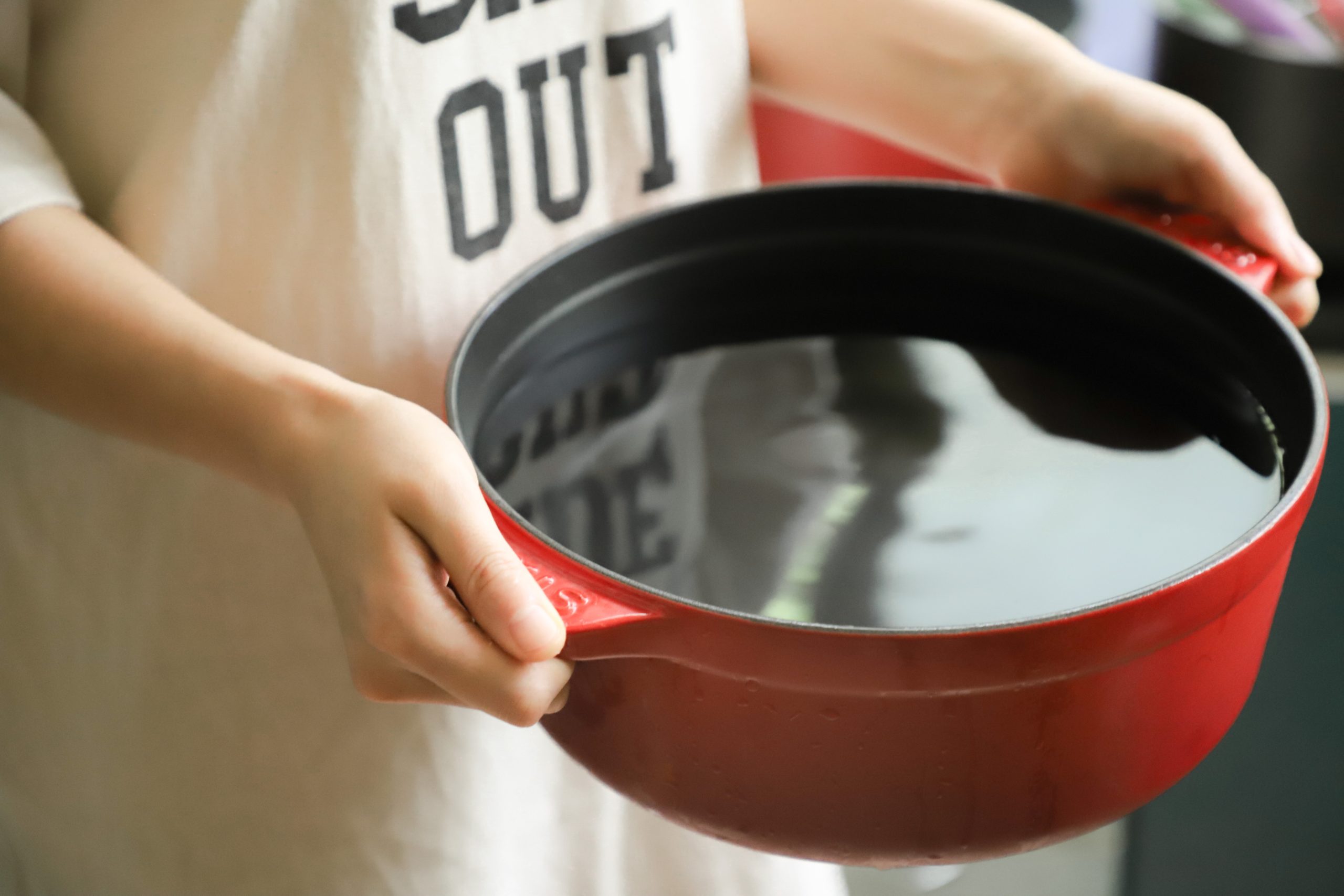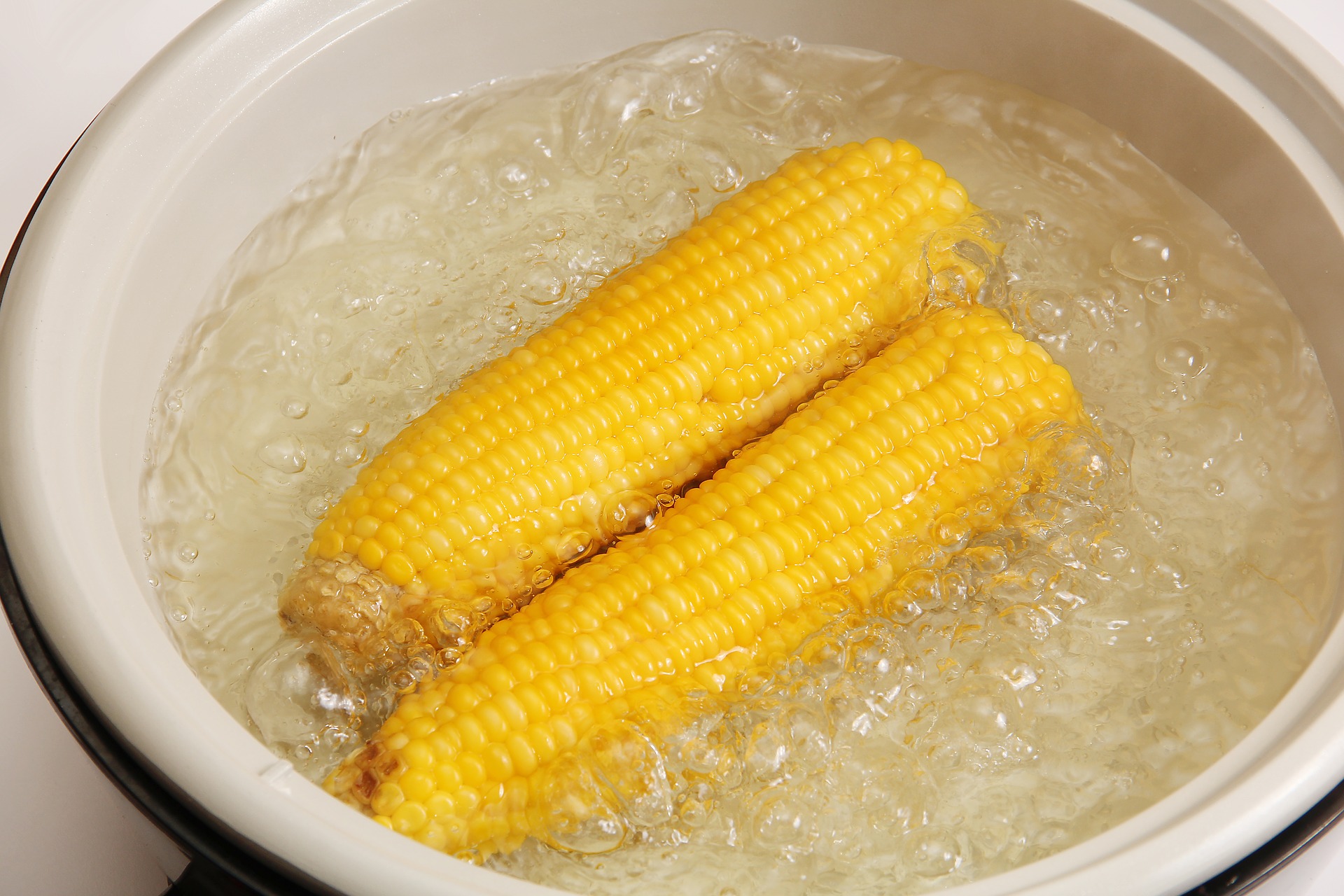However, if you can cook with filtered water, do so because it minimizes the risk of contracting waterborne infections. If you reside in a region where the water is contaminated, you may contract an infection or develop an allergy due to drinking tap water. However, there isn’t much damage in doing so in general.
However, even if you like to cook with tap water, we recommend not washing your fruits and veggies with it. If you don’t buy organic, the veggies and fruits are filled with pesticides, and washing them with conventional tap water may introduce more bacteria and other microbes. Instead, use filtered water to wash them. Washing your fruits and veggies with baking soda is one technique to ensure that they are pesticide-free.
Is It Okay To Drink Heated Water Instead Of Distilled Water?
No, they’re not the same thing. Boiled water is just water that has had its temperature raised to the point where it boils. This kills a variety of microorganisms that might cause illness. Water that has been cleansed of all contaminants, including minerals and microbes, is known as distilled water. Distilled water may be better for you than tap water, depending on where you live. If the tap water in your town contains dangerous chemicals or pesticides, you’re better off drinking distilled water.
Is It Safe To Cook With Tap Water?
The majority of people are unsure whether tap water is suitable for cooking. While we don’t recommend using tap water for cooking or cleaning (especially if you have the option of utilizing filter water), there are situations when you may need to. Many people believe that boiling tap water at a high temperature would destroy all bacteria; thus, using it for cooking is fine. When it comes to water, though, the issue isn’t just about the bacteria and other microbes that thrive in water.
Despite widespread understanding that tap water is unsuitable for cooking and can cause various diseases and illnesses, many people continue to do so. As a result, we decided to seek the advice of an expert. We spoke with a dietician and sports nutritionist in Mumbai to clear the air.
What Effects Does Hard Water Have On Baking?
Baking with hard water will result in a challenging, rubbery dough. Yeast is another component that is negatively impacted by hard water. The minerals make it difficult for the flour to absorb water, interrupting the yeast’s fermentation process and leaving your bread rough and dry. According to the website of King Arthur Flour, Tough water might slow down yeast fermentation and generate a tightening effect. Another factor to consider is the pH of your water. Although hard water has a higher pH, most baking professionals recommend using slightly acidic water. Hard water’s dissolved minerals can alter the structure of gluten and affect the performance of components like yeast.
Types Of Water For Cooking
1. Soft Water
There are little or no dissolved minerals in soft water. Calcium, magnesium, iron, and manganese are just a few examples.
Water softening is a method that is used to make water soft. Filters and “ion exchange” are used to remove dissolved minerals.
Minerals that cannot be removed by specific filters are removed using a “ion exchange” softener. Resin beads containing sodium ions are used in softeners. This resin draws dissolved calcium and magnesium as water enters the tank. The sodium is subsequently “exchanged” for dissolved compounds. Finally, the contaminants are removed.
2. Reverse Osmosis Water
We all put time, effort, and money into the kitchen. So, if we want the greatest results, shouldn’t we cook with filtered water?
While you can cook with either hard or soft water, reverse osmosis water is advised. Because reverse osmosis filters out more pollutants and minerals than any other technique of filtering.
3. Boiling Water
Unfiltered water may take longer to prepare, in addition to having a bad flavor. Because, for example, hard water takes longer to boil. At a particular temperature, water boils. However, the boiling point changes depending on a number of conditions.
To begin, it’s critical to comprehend vapor pressure. The pressure required to convert a liquid to a gas is known as vapor pressure. The vapor pressure of water rises as the temperature rises.
The molecules of water travel quicker and faster as the vapor pressure rises. This action generates energy. The heat from the liquid escapes, causing the water to boil. When minerals, such as those present in hard water, are cooked with water, the vapor pressure is more sensitive, and boiling takes longer.
Why Should You Avoid Drinking Distilled Water?
Aside from having a flat flavor, distilled water lacks minerals like calcium and magnesium present in tap water. As a result, consuming distilled water may draw minerals from your body, including your teeth.
Aside from having a flat flavor, distilled water lacks minerals like calcium and magnesium present in tap water. As a result, consuming distilled water may draw minerals from your body, including your teeth.
Distillation is a natural process that removes pollutants from water and leaves it in its purest form, similar to the Earth’s water cycle. It is deemed safe to drink because no potentially dangerous disinfectants or other chemicals are introduced throughout the procedure.
Is Distilled Water The Same Thing As Boiled Water?
The pure H2O is boiled out of its impurities during the distillation process. As a result, many pollutants discovered in water are inorganic minerals, metals, and similar substances. As the water (with its pollutants) boils, the pure water condenses into steam, is caught, and cools, resulting in distilled water.
Distilling water on your stove is a straightforward technique. Place a glass or metal bowl in a stainless steel saucepan halfway full of water and let it float. Cover the pot with ice cubes and cover it with an upside-down lid. Turn on the element and wait 45 minutes for the water to heat up or boil, replacing the ice as needed. The water collected in the glass bowl is distilled once the process is completed.
What Are The Advantages Of Water Consumption?
Without question, the most important benefit of drinking water is to stay alive. But, aside from that, staying hydrated offers a slew of additional health benefits, so here are some water facts and information on its numerous health effects.
- Drinking enough water keeps your body temperature in check.
- It aids in the lubrication of your joints.
- It protects your spinal tissue.
- It assists you in eliminating waste from your body through urine, stool, and sweat.
- One of the most excellent methods to avoid notoriously unpleasant kidney stones is to drink enough water each day.
Is It Okay To Cook Chicken In The Sink?
However, if asked, we would advise against cooking with tap water. According to science, boiling water is safe to drink since all germs and bacteria are washed away thoroughly. But the problem goes deeper than germs and bacteria. Insecticides, pesticides, and antiseptics are all found in water.
While washing raw meat or poultry may appear to be the most excellent way to ensure that it is clean, it distributes bacteria to your sink, worktops, and other kitchen surfaces. Meat, poultry, and eggs do not need to be washed; cook them thoroughly.
Secondary navigation is available. Credit: Washing raw chicken before cooking can raise your chance of contracting campylobacter bacteria, which can cause food poisoning. The bacteria can be transmitted to hands, work surfaces, clothing, and culinary equipment by splattering water from washing chicken under the tap.
What Are Some Of The Drawbacks To drinking Boiled Water?
The main danger of drinking hot water is getting burned. Even if the water is pleasant to the touch on the tip of a finger, it might nevertheless burn the tongue or throat. A person should avoid drinking water near boiling temperature and should always take a little sip before swallowing a significant amount.
It is dependent on the type of pollutant. While boiling water kills bacteria, it does not affect lead, nitrates, or pesticides because boiling reduces the volume of water, the concentration of pollutants increases.
Drinking hot water might help stimulate your digestive system and aid digestion, and it can also aid in the removal of waste from the body. Hot water, in particular, has a relaxing effect on your nervous system, and it can help relieve pain and tension in your body if you take it daily.
What Kind Of Water Is The Healthiest To Drink?
Purified water, like distilled water, is a good option if your local water supply is contaminated. However, many countries cleanse tap water, so every time you fill a cup from your kitchen sink, you’re drinking pure water. Mineral water and alkaline water are two of the healthiest forms of water since they give your critical body minerals, but the most important thing is to drink clean, safe water.
Tips For Staying Away From Contaminated Water
- Even though bottled water may include contaminants such as pesticides, it is safer to consume than tap water in nations where cleanliness is a concern. However, proceed with caution. Unscrupulous merchants can sometimes fake “sealed” bottles with a drop of adhesive. Carbonation shows that the drink has been sealed from the factory; thus, anything carbonated is a safer choice. Drinking scalding hot water, such as hot tea, should be fine, and concentrate juice has the potential to be hazardous.
- It’s not a good idea to drink water from the faucet, but it’s also not a good idea to let water into your mouth while showering. Brushing your teeth is the same way, so obtain it from the bottle instead.
- Also, because ice is often created from municipal water, avoid it.
- Because the public water system does not supply natural well water, it is up to you to ensure that it is safe to drink.
- According to the National Groundwater Association, personal wells should be tested by a professional at least once a year. This is true for the 15 million American families that rely on wells as their primary water supply.
Conclusion
When it comes to cooking, using reverse osmosis water from your system can make a significant difference in how your food tastes. Using clean water will ensure that everything you cook is free of pollutants, whether you’re boiling pasta, preparing soup, making a hot beverage, or anything else. It’s no surprise that many of today’s most excellent restaurants use RO water systems for all of their cooking.


